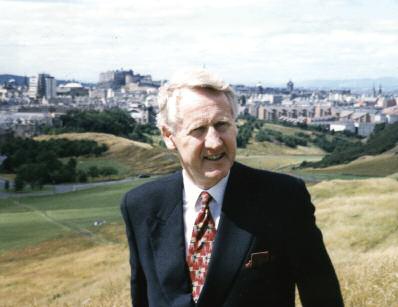When I was a schoolboy at school in Dunbar during one recess, my father took myself and my older brother in a rowing boat from the North Berwick harbour. He was a man of enormous physical strength, having been middleweight boxing champion of Scotland. He proceeded to row the small boat across a considerable expanse of sea to the island of Craigleith. We pulled the rowing boat onto the island and walked up to the top. And whilst there, to our astonishment the weather suddenly changed for the worse. A ferocious wind from the west hit us with such force that one could almost lean against the wind without falling over.

We rapidly descended to the boat to realise the waves had become massive and that it would be a powerful effort to get the rowing boat away from the island. I was sitting in the bow of the boat and promptly became soaked from head to toe, and my father who was extremely determined started to row with tremendous deliberate strokes of the oars. Every time he took a powerful stroke the boat would surge forwards, to be swept back by a huge wave larger than a man standing up.
I had just learnt to swim, taught by the legendary Mr McCracken of North Berwick swimming pool and I reckoned I would be able to make it to the island but that it was something I would prefer not to do. Gradually, little bit by little bit, my father’s strength began to show and after an hour he was about 150 yards from the island but we still had a very long way to go before reaching North Berwick harbour. It was at that moment I saw the North Berwick pilot boat coming towards us and said something to that effect. My father paid no attention; he kept on rowing. And then to my intense relief the pilot boat came alongside us to pick us up and to tie our boat to its stern.
For me this was one of the greatest excitements of my life. But there was not a moment to be lost. A split second after we came on board the captain pointed his ship towards the North Sea and the boat responded with a roar of the engines and forged its way forwards through the mighty waves. The captain was a man of few words, but his purpose was clear. Two young students had hired another rowing boat, but lacking the exceptional physical strength of my father, they had battled in vain against the waves and had been swept literally miles out to the North Sea and were being blown towards north-west Europe.
After what seemed like a lifetime, when we were almost out or sight of land we caught up with the students and when the boat circled around their rowing boat they collapsed in the bottom of their boat with fatigue and exhaustion. However the captain of the pilot boat was having none of it. He thrust his head out of the bridge and shouted at them “Keep rowing you wet shower”. As a small boy, rightly or wrongly, I found this extremely entertaining but my admiration for the captain was also accompanied by a great deal of respect. The two students were then hauled on board and they looked to me like young men who had believed that their last hour had come. And then without further ado the pilot boat with the engine throbbing with a steady throttle made its way back to North Berwick harbour.
As we came into land something happened which is vividly etched on my memory, although I recall it with sadness. The fisherman, Mr Pearson smiled down on us as we came in and said “I see you have experienced a wee sea breeze”, which we felt was the understatement of a lifetime. Even so, Mr Pearson in spite of his great expertise, in a terrible storm some time later, lost his life when his boat was overturned by monstrous waves. He was a courageous, kindly and kenspeckle figure in North Berwick who will always be remembered with warmth and affection, who lost his life as a result of freak weather conditions.
The memory of being saved by the pilot boat and of Mr Pearson’s wise and kindly influence left me with the certain knowledge that the sea was capable of confronting those who travelled upon her with great danger and peril. And those who derive their livelihood from fishing, and those who serve with the lifeboats which replaced the pilot boats, are to be thanked and supported.
My last memory of this astonishing experience was walking along the sands on the way home, and my father said to me “no need to say anything about this to your mother”.
Lord James Douglas-Hamilton was educated at Carlekemp, Belhaven Hill, Eton, Balliol College Oxford and Edinburgh University. He was an Oxford boxing blue; MP for Edinburgh West (1974-97); a Scottish Office minister (1987-97), and MSP for Lothian from 1999-date. He was appointed a life peer as Lord Selkirk of Douglas in 1997.